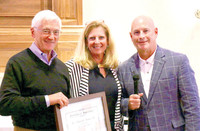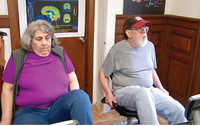By THOMAS GREENBERG According to research done by Brain in Play, a foundation run by Cranston resident Bill White, the effects of dementia can be lessened by a controlled regime of activities. The Brain in Play foundation has been doing hands-on research
This item is available in full to subscribers.
We have recently launched a new and improved website. To continue reading, you will need to either log into your subscriber account, or purchase a new subscription.
If you are a current print subscriber, you can set up a free website account by clicking here.
Otherwise, click here to view your options for subscribing.
Please log in to continue |
|


According to research done by Brain in Play, a foundation run by Cranston resident Bill White, the effects of dementia can be lessened by a controlled regime of activities.
The Brain in Play foundation has been doing hands-on research since its inception in 2013 at senior living facilities throughout the state including Victoria Court in Cranston and Greenwich Farms in Warwick.
Now, their research is being published internationally in a special edition of Alzheimer’s & Dementia, a journal by the Alzheimer’s Association used by neuroscientists and members of the scientific community across the world. The tangible results that Brain in Play has produced are the reason for this.
White calls what they’ve found a type of epigenetics, which doesn’t involve any type of medication.
“It says that if you do certain kinds of behaviors at threshold [meaning with precise measurement], if you do certain types of wellness behaviors with the right duration, intensity, and frequency, you can change your brain health,” he said.
White said Brain in Play has a patent-pending system of ‘best practices’ that include exercise, nutrition, stress management, ‘mindfulness,’ and sleep hygiene. The catch – they’ve developed a “precise” way of measuring these activities that have, according to White, led to cognitive and memory changes in his patients.
“The issue for those basic things is that is has to be precise,” he said. It’s not just going to LA Fitness and riding a stationary bike for 15 minutes. You have to do it for 20. You have to do that endurance exercise for 20 minutes for three times a week. You have to do things precisely and you have to do it for at least 6 to 7 weeks.”
That preciseness has been tested by Brain in Play with their three to four hundred patients across Rhode Island. Through standardized tests, such as the Saint Louis University Mental Status (SLUMS) Alzheimer’s test, which they administer up front with patients then around three to four months later, Brain in Play can measure improvements in brain function, thought processing, and memories, according to White.
Out of more than 300 patients involved in the study, about half had mild cognitive impairments and ended up falling on the “normal range” after the practice period, White said.
In addition to this, all of the patients showed improvements neuro-cognitively and mood-wise because of the tests, he said.
“When families sign on and they see their loved ones get better it’s very inspiring.”
Not everyone has the same level of positive results, he admits.
“It’s kind of like making that perfect soup,” he said. “You find out what the best practices are that have been proven to change brain function in a positive way and knit them together.”
Now that his research has yielded results and the foundation’s findings are documented, it will be made available to neurologists and other people in the field around the world.
The founders of the foundation are Bill and Katharine White, who serve as president and CEO, respectively. The foundation is funded by donations on its non-profit side and is also a certified medical practice that patients pay for through health insurance.
Bill was the chief operating officer and chief patient care officer at Bradley Hospital for 20 years prior to founding Brain in Play and Katharine has also been an advanced practice nurse for many years. They founded Brain in Play to do research and clinical work that will ‘make a difference’ with dementia.
Bill also says his inspiration comes from the death of his mother from dementia, which “ripped his heart out.”
“If we knew then what I know now we probably would have had her at a more lucid level for two to three years and that’s worth everything” he said. “There’s a good chance if we can do this for brain wellness we could see people staying in great physical and neurological shape into their hundreds.”
The Whites will continue to try to combat the dementia disease that affects so many elderly citizens on a daily basis as the Brain in Play foundation continues their work moving forward.
Calls to Greenwich Farms and Victoria Court were not returned.
Comments
No comments on this item Please log in to comment by clicking here